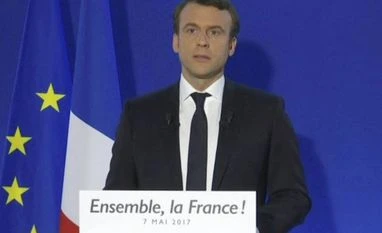Emmanuel Macron emerged from one of the most brutal and eventful election campaigns in recent European history as France’s next president. This was a campaign in which France’s domestic security, in the shadow of repeated terror attacks, was never far from the centre of broader debates about France’s future.
Macron has promised to increase security spending, strengthen internal security services and introduce new centres to integrate people returning from fighting for so-called Islamic State. But solving the riddle of France’s recent security woes is going to require wide-ranging action and reform. This will present the new president with one of the biggest challenges of his presidency.
The complex, bureaucratic and disjointed French intelligence services need reform. Macron has remained fairly silent on specific proposals to change the way they work, promising instead to increase defence spending in more abstract terms. This will not deal with the ineffective and overly complex “S-list”, a system for monitoring security threats. Over its history, the list, created in 1969, has contained over 400,000 names, including organised crime figures, anarchists and ecologists, as well as terror suspects. Being placed on this list, however, does not come with automatic obligations for the authorities to monitor or sanction a particular individual.
Policing the banlieues
Reforms are also needed to French policing, particularly in the banlieues, the poor suburban estates that ring French cities. These suburbs are not hotbeds of Islamic extremism as some have claimed but rather are in the grip of their own security crisis. While France has extremely well-equipped police forces, their practices in policing the banlieues is an Achilles heel. Macron has promised an extra 10,000 police jobs but without a change of tactics this will make little difference to the day-to-day realities of insecurity.
From my research in urban and suburban areas in France, I’ve seen a pattern emerging where the police are seen as an “all or nothing” presence. On a daily basis, the police are markedly absent from the cités, the large housing blocks in the banlieues. Petty crimes go unreported, and when reports are made to the police – if the victim lives in the “wrong” area – they are unlikely to turn up.
When the police do show up, it is to carry out raids with heavily armed special forces and helicopters. But without the everyday security and regular policing, these one-off raids mean very little to improving day-to-day security. After one high-profile raid of drugs outlets in the La Castellane area of Marseille, for example, the trade moved seamlessly across town to the Felix Pyat estate.
Neglected for decades, the drugs trade is often the most powerful social organisation in these estates, providing jobs and status for generations of young men. The international “French connection” system of transit trafficking has been replaced with “narco-banditisme”. This supplies domestic demand: France has the largest per capita consumption of cannabis in the EU. Cannabis resin is the staple of this trade, known colloquially as le shit, and is brought in via organised crime from Morocco to Spain and then sped across the border into France on what’s called the “go fast” route.
Guns and jails
This trade is dependent on weapons, which has lead to a proliferation of guns on the streets of French cities. Weapons like the AK-47 (colloquially “la kalach”) have become the go-to tool for petty robberies across France. Coming via organised crime networks stretching into the Balkans, this trafficking route has been linked to the way the guns used in the Charlie Hebdo and Paris in 2015 attacks were sourced. Without effective policing of the daily grind of drugs trafficking, heavy weapons will remain in demand in France and present any potential terrorist with a plentiful and available stockpile from which to operate.
The prominence of organised crime also means people from these suburbs often spend time in prison. French prisons, however, are often insecure with prisoners living in terrible conditions. They have been condemned by the European Court of Human rights. Many recent perpetrators of terrorism in France spent time in prison. Reforming this system, where overcrowding is rife, is going to require significant political backing for funding and reform.
The thread that runs through these problems is the need for an integrated and coherent approach to improve the security situation in France. It is not practical to concentrate on security only when it becomes an emergency, after a terrorist strikes and lives are lost. Rather, Macron will need to tackle the chronic, daily, security issues France faces and overcome the institutional atrophy and social marginalisation which are such powerful drivers of insecurity.
There is a reason, however, that previous administrations have not tackled these issues: they are politically explosive and economically costly. In a presidency that is already looking crowded with political challenges and policy promises, where building a broad base of support without a party after the parliamentary elections in June looks difficult at best, there is a risk that these issues will be once again pushed to the back of the queue.
Joseph Downing, Marie Curie Fellow, Centre national de la recherche scientifique (CNRS)
This article was originally published on The Conversation. Read the original article.
To read the full story, Subscribe Now at just Rs 249 a month
Already a subscriber? Log in
Subscribe To BS Premium
₹249
Renews automatically
₹1699₹1999
Opt for auto renewal and save Rs. 300 Renews automatically
₹1999
What you get on BS Premium?
-
Unlock 30+ premium stories daily hand-picked by our editors, across devices on browser and app.
-
Pick your 5 favourite companies, get a daily email with all news updates on them.
Full access to our intuitive epaper - clip, save, share articles from any device; newspaper archives from 2006.
Preferential invites to Business Standard events.
Curated newsletters on markets, personal finance, policy & politics, start-ups, technology, and more.
Need More Information - write to us at assist@bsmail.in
)